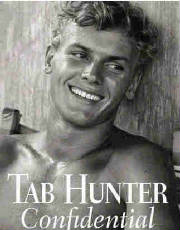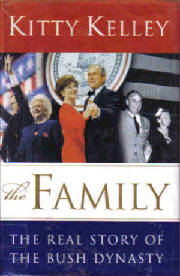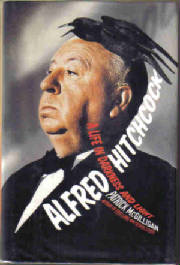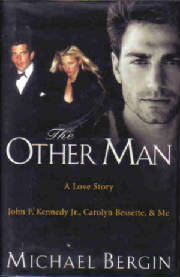|
Books
THE HURDY GURDY MAN: The Autobiography of Donovan. Donovan Leitch.
Donovan was a popular folk-rock singer of the sixties who – according to him – “dropped out” of commercial
show biz when he was only twenty-four. Obviously feeling that his contributions to music have been overlooked, and he himself
under-appreciated, he tries to set the record straight in this autobiography. Donovan tries hard to create a certain mystique
of outsider, rebel and non-conformist -- “leaving home” at sixteen [he actually simply went off for a summer of
frolic the way many teens do] – when he's really a reasonably talented poet and composer who became famous at the obscenely
early age of eighteen. He never addresses the fact that his multi-millionaire status was hard to reconcile with his role as
the originator of “flower power.” This is a book less interested in truth than it is in explaining Donovan's greatness,
which he does on every other page, citing artists whose work was heavily influenced by his own. The funny thing is, Donovan
may well be right about his influence, but he should have let somebody else say it – again and again and again. Along
the way we learn how much of his music was influenced by his love for the woman he eventually married. We learn of numerous
affairs, his disillusionment with the music scene, what an insensitive jerk he could be in a rare and surprising moment of
candor and self-analysis, and his rather dopey conversion to Yoga. Donovan writes well, but the book is weakened by his need
to constantly reaffirm his importance. Although he includes photos and brief mentions of his four children, he never tells
us anything about them. For instance, he never mentions, or expresses pride in, his son Donovan Leitch's considerable acting
ability. But then, people who become famous at eighteen often grow up with a very warped set of values – and a sense
of Themselves Over All. William Schoell.

TAB HUNTER CONFIDENTIAL. Tab Hunter and Eddie Muller. Algonquin Books.
Once a movie star, always a movie star – and is there anything on earth more self-absorbed
than a movie star? Tab Hunter tells how a great-looking guy with absolutely no acting experience managed to become fading
star Linda Darnell's leading man in one of her last pictures, and then moved onward and upward to become a movie star in his
own right, appearing in such films as Damn Yankees and The Pleasure of His
Company. He doesn't gloss over how he quickly descended to the depths as a Hollywood
has-been, then made a comeback of sorts by co-starring with Divine in two funny movies. Hunter's story is reasonably absorbing
and somewhat enlightening about Hollywood, but what it mostly does is remind us of the shallowness of movie stars –
all movie stars. Not being normal people, they just don't get it. For instance, on one page Hunter [or rather his co-author]
writes how disappointed he was that his then-agent Henry Willson wasn't behind him more when he tested for an important role.
He complains that Willson didn't care if he got the role as long as it was one
of his many clients. So much for loyalty Hunter complains, or words to that
effect. What did Hunter expect Willson to do – focus only on him and to hell with all of his other
clients!!! It just doesn't occur to Hunter how hypocritical he sounds. Considering that
he's out of the closet – a decision that may have had more to do with the fact that his sexual orientation was pretty
much an open secret as opposed to true self-acceptance on his part -- Hunter refers to certain people he dislikes as “fags”
a lot more often than he should. But then, Hunter comes across as moderately likable but not especially bright. This is by
no means an essential read but many people will find it absorbing. William Schoell
 THE FAMILY: THE REAL STORY OF THE BUSH DYNASTY. Kitty Kelley. Random House; 2004.
“His religiosity allowed him to live in a black-and-white world of absolutes with no bedeviling
in-betweens.” Thus Kelley writes of our current president, George W. Bush, in this fascinating look at the Bush political
family from Senator Prescott Bush down to George H. W. Bush (“Poppy”) and way down to George W. Bush (“Dubya”):
these last two better known as “Dumb and Dumber.” Surprisingly, this is not just a Bush-bashing extravaganza (although
the family has given Kelley plenty of ammunition). Kelley relates how George H. W. Bush's father Prescott had more of a social
conscience than either his son or grandson, both of whom radiate an air of entitlement. She gives credit where it's due to
the two presidents, describing the father's sensitive nature and compassion (at least towards people of his class) and the
rare – very rare-- good points of his son. Although both Bush presidents claim to be self-made men against all evidence
to the contrary, Kelley exposes this hypocrisy and details how connections got both – especially Bush Jr. -- into the
White House. This is by no means just a collection of gossip – Kelley explores the behind-the-scenes elements of political
campaigning, in-fighting and betrayal with savvy and industrious insight. Kelley also examines the lives of the wives, children,
siblings, cousins and so on, including arrogant screw-up Neil Bush. You'll also learn how Jeb Bush
petitioned for the release of anti-Castro terrorist Orlando Bosch, who blew up a plane with 75 people aboard (including Cuban
athletes), and how his father granted the terrorist U.S. residency! Kelley describes Barbara Bush not as a lovable grandma
but an unpleasant frump who keeps grudges, snaps at people, and is just as uncultured as her husband and son. [Although Kelley
seems to criticize Barbara Bush for saying that Washington D.C. mayor Marion Barry was a “disgrace,” no other
word really describes the man.] The book goes into our current president's misspent youth when he majored in beer-drinking
and making an ass of himself (he's given up the former but still does the latter), as well as his days as a cheerleader (he's
not as athletic as his father was). [Kelley tells an anecdote about Bush confusing “tears” (of joy) with “tears”
(a piece of paper) which is hilarious!]
The Family makes it clear that the Republican party
has undergone a change-for-the-worse due to the influence of the religious right, which Republican candidates increasingly
cater to – to the detriment of the nation. Kelley also examines sexuality and “manhood” and how it relates
to the White House. While some of Kelley's sources, such as embittered, discarded wives and the like, may not be terribly
reliable, most of the book is exhaustively researched, well-documented, and highly credible. A splendid, immensely readable
book! -- William Schoell
 ALFRED HITCHCOCK: A Life in Darkness and Light. Patrick
McGilligan. Regan Books.
Although
the portrait that emerges of Alfred Hitchcock is not entirely devoid of weird, negative aspects, this book is in a sense an
“answer” to Donald Spoto's more “sinister” The Dark Side of Genius, which McGilligan frequently refers to. McGilligan's massive tome is a
thorough, very readable, and well-researched look into the life of the “master of suspense,” in which the author
attempts to put some of the more negative things written about the great filmmaker into context. Not that he's above getting
into a little “gossip” -- there are details on Hitchcock's impotence, his wife Alma's possible affair with a young
screenwriter, Ingrid Bergman supposedly trying to get Hitch into bed, and Hitchcock's relationship as surrogate father to
Brigitte Auber, who appeared in To Catch a Thief. [Auber
felt betrayed when Hitchcock made a pass at her and cut him completely out of her life. The fact that he tried to make up
with her despite his undoubted mortification suggests that Hitchcock wasn't just interested in her sexually but genuinely
cared for her. Auber comes off as extremely unsophisticated, na´ve, and unforgiving.] We also learn
more about Hitchcock's relationship with 'Tippi' Hedren, star of The Birds and the criminally under-rated Marnie. McGilligan provides
fresh details about the making of Hitchcock's films, even ones that had extensive pre-production but
never actually got before the cameras. This is all very compelling stuff for Hitchcock admirers, and will make you want to
revisit his films as soon as you put the book down. There are some dumb moments, however. McGilligan suggests that some of
Hitchcock's leading men failed to give “romantic” performances because they were homosexual (he never uses the
term “gay” for some reason, giving the book a dated ambiance) -- but isn't that why they call it acting. He may not have been a great thespian, but Rock Hudson could certainly love up the women on the
screen convincingly despite his sexual orientation. Perhaps the gentlemen McGilligan refers to may have been unconvincing
as romantic leads not because they were gay but because they just weren't cut from that same sexy “lover boy”
cloth as Hudson
--William Schoell
 THE OTHER MAN. Michael Bergin.
Michael Bergin is the well-known actor and Calvin Klein underwear model who was involved with
Carolyn Bessette before (and after) she married John F. Kennedy Jr. His autobiography focuses on his
relationship with Carolyn – this was probably dictated by the publisher – and offers interesting details of it,
but it's too bad that this aspect crowds out the other fascinating elements of Bergin's life. The
behind-the-scenes glimpses of the life of a male model and the cutthroat modeling industry are so compelling that you often
wish Bergin had focused mostly on this and left the Bessette business for one chapter only. Bergin emerges as a likable, sympathetic
(if somewhat humorless?) figure, however; someone who is not above seizing an opportunity when it presents itself (which is
intelligent, of course) without necessarily being a “user.” On the other hand, like most people, Bergin doesn't
always see the reality of his life clearly (or doesn't want to, again like most people). He writes about the pride his family
had in seeing him posing in his underwear in a huge poster in Times Square without the slightest trace of irony. Later
he wonders why Bessette ultimately chose JRK Jr. over him, even though he spells out what was going on at the time. While
he and Bessette were dating, Bergin was living (platonically) with an older gay man who fell unrequitedly
in love with him and was tormented by his feelings. Even after learning this, Bergin still didn't move out of the older man's
apartment for some time. It doesn't seem to occur to him that Bessette might have wondered if he were bisexual. Or if he was
only “using” her the way she could have thought he might have been “using” the older man (Bessette
was instrumental in getting Bergin the high-profile job for Calvin Klein, after all). Again, Bergin doesn't really come off
as a ruthless opportunist stereotype, but surely Bessette might have wondered how much he really cared for her? In
any case, the book is a surprisingly good read. Bergin got a lot of criticism for coming out with the book, but look at it
from his point of view. Everyone else and his brother was having his say not only about JFK Jr. and Carolyn but even about
Bergin's relationship with her, so why shouldn't he, an actual participant, have had his say as well? Quite enjoyable and
fast-paced and with lots of sexy pictures. Say what you will about his writing and his book, Bergin is a very hot guy.
|

